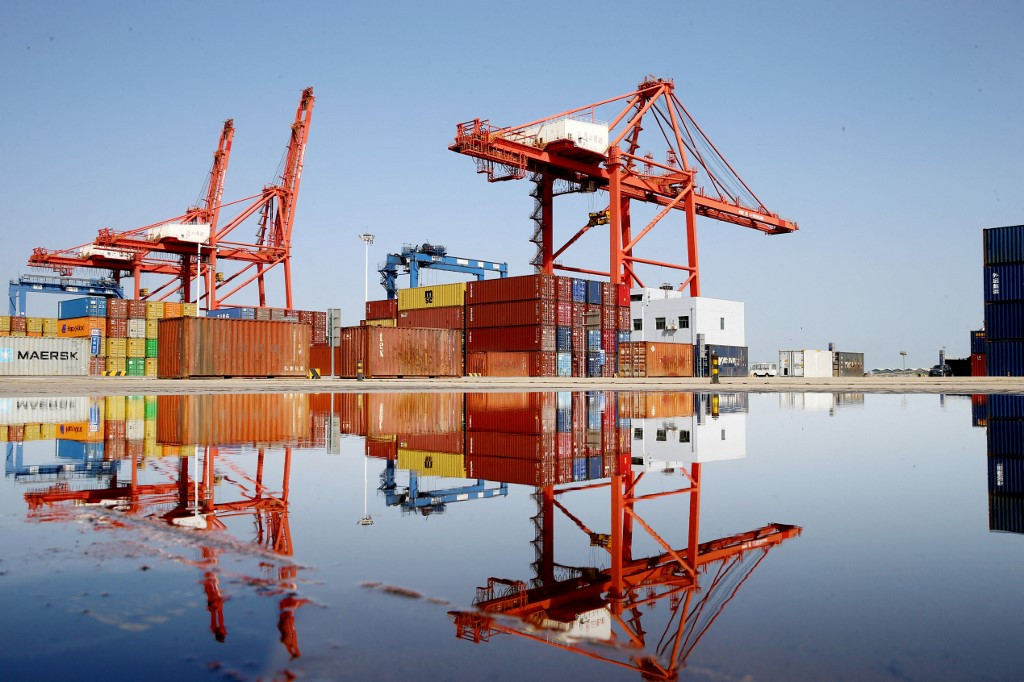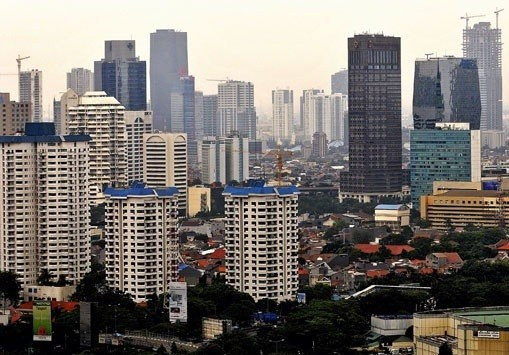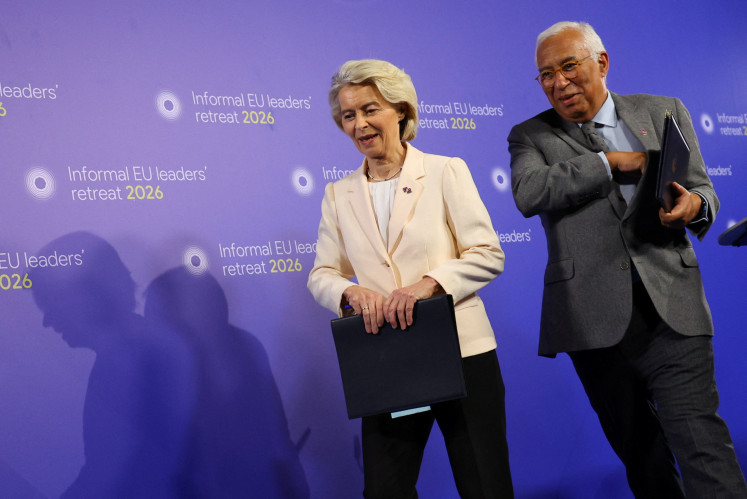Popular Reads
Top Results
Can't find what you're looking for?
View all search resultsPopular Reads
Top Results
Can't find what you're looking for?
View all search resultsChina Q1 GDP growth beats expectations, but US tariff shock dims outlook
President Donald Trump has ratcheted up tariffs on Chinese goods to eye-watering levels, prompting Beijing to slap retaliatory duties on US imports in an intensifying trade war between the world's two biggest economies that markets fear will lead to a global recession.
Change text size
Gift Premium Articles
to Anyone
 Containers and cranes are seen at the container port in Lianyungang, in Chinas eastern Jiangsu province on April 13, 2025. China said on April 14, that exports soared 12.4 percent year-on-year last month, beating expectations as Beijing navigated mounting trade headwinds sparked by US President Donald Trump. (AFP/AFP)
Containers and cranes are seen at the container port in Lianyungang, in Chinas eastern Jiangsu province on April 13, 2025. China said on April 14, that exports soared 12.4 percent year-on-year last month, beating expectations as Beijing navigated mounting trade headwinds sparked by US President Donald Trump. (AFP/AFP)
C
hina's first-quarter economic growth beat expectations, underpinned by solid consumption and industrial output even as policymakers brace for the impact of US tariffs that analysts say pose the biggest risk to the Asian powerhouse in decades.
President Donald Trump has ratcheted up tariffs on Chinese goods to eye-watering levels, prompting Beijing to slap retaliatory duties on US imports in an intensifying trade war between the world's two biggest economies that markets fear will lead to a global recession.
Data on Wednesday showed China's gross domestic product (GDP) grew 5.4 percent in the January-March quarter from a year earlier, unchanged from the fourth quarter, but beat analysts expectations in a Reuters poll for a rise of 5.1 percent.
The outlook is expected to dim, however, as Washington's tariff shock hits the crucial export engine, heaping pressure on Chinese leaders as they try to keep the world's second-largest economy on an even keel and prevent mass job losses.
Government stimulus boosted consumption and supported investment, said Xu Tianchen, senior economist at the Economist Intelligence Unit, calling the 5.4 percent pace "a very good start."
"In each of the past two years China had a high-flying first quarter and an underwhelming second quarter," Xu said, adding that "a forceful and timely policy response" is needed given the additional pressure stemming from US tariffs.
A string of recent data has pointed to an uneven economic recovery, with bank lending beating expectations and factory activity picking up speed. But higher unemployment and persistent deflationary pressures are fueling concerns over weak demand.
Moreover, analysts say a surge in China's March exports - driven by factories rushing shipments to beat the latest Trump tariffs - will reverse sharply in the months ahead as the hefty US levies take effect.
For 2025, the economy is expected to grow at a subdued 4.5 percent pace year-on-year, the Reuters poll showed, slowing from last year's 5.0 pace and falling short of the official target of around 5.0%. Many analysts have sharply slashed their GDP forecasts for this year.
UBS has downgraded its forecast on China's 2025 growth to 3.4 percent from 4 percent, on the assumption that Sino-US tariff hikes will remain in place and that Beijing will roll out additional stimulus.
"We think the tariff shock poses unprecedented challenges to China's exports and will set forth major adjustment in the domestic economy as well," analysts at UBS said in a note.
While several other countries have been swept up in US tariffs, Trump has targeted China for the biggest levies.
Last week, Trump lifted duties on China to 145 percent, prompting Beijing to jack up levies on US goods to 125 percent and dismissing US trade actions as "a joke".
On a quarterly basis, the economy expanded 1.2 percent in the first quarter, slowing from 1.6 percent in October-December.
Retail sales, a key gauge of consumption, rose 5.9 percent year-on-year in March after gaining 4.0 percent in January-February, while factory output growth quickened to 7.7 percent from 5.9 percent in the first two months. Both numbers topped analysts' forecasts.
The retail sales uptick was driven by sharp double-digit gains in home electronics and furniture sales, helped by the government's consumer goods trading scheme.
But China's property downturn remained a drag on overall growth.
Property investment fell 9.9 percent year-on-year in the first three months, extending the 9.8 percent drop in January-February. March new home prices were unchanged on month.
Policymakers have repeatedly said the country has ample room and tools to bolster the economy and premier Li Qiang this month pledged to roll out more support measures.
Beijing has put boosting consumption as the top priority this year as they try to cushion the impact of the Trump administration's tariffs on its trade sector.
The Politburo, a top decision-making body of the ruling Communist Party, is expected to hold a meeting later this month to set its policy agenda for the coming months.
In March, China unveiled fiscal measures, including a rise in its annual budget deficit. Officials have flagged more fiscal and monetary stimulus to cope with rising headwinds. That followed a blitz of monetary easing steps late last year.
Earlier this month, Fitch downgraded China's sovereign credit rating, citing rapidly rising government debt and risks to public finances, suggesting a tricky balancing act for policymakers seeking to expand consumption to guard against a trade downturn.










